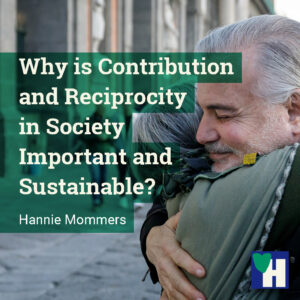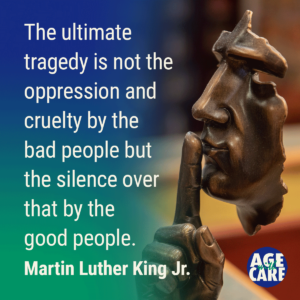
Both Tom and I talk a lot about contributing and reciprocity in society. With our friends. In our blog posts. In our Facebook posts. Most of the time this is about volunteering in some way or another. But there are many other ways.
Reciprocity in society is a common gesture. A neighbor smiles at us and next time when they are not at home, we collect their delivered goods from the courier.
Society is built on written and unwritten laws. Some are evident. You do not enter another person’s house without an invitation. Others are less obvious. For example, when you borrow your neighbors’ chainsaw, they might expect you to be extra careful when you use it.
Some of the links are affiliate links. As an affiliate associate, we earn a commission when you purchase any of the products offered through the shared links at no extra cost for you. This helps us maintain this website.
Table of contents
Is reciprocity in society important?
Society thrives if its participants care for one another. By giving without expecting anything in return, most feel compelled to give back something in return. When there is nothing to give in return, reciprocity can also be done by giving forward.
Reciprocity in society

Nowadays it’s a business model to offer a gift on a website, as we for instance do with our eBooks about Waste and Rainbow Food. In exchange, the receivers give their email address.
It’s not a new business model. Small business owners such as bakers or butchers traditionally gave a biscuit or slice of sausage to customers. That way, they maintained customer loyalty, because the next time customers would probably buy from them again and not from the competitor.
If you ask someone over for a coffee and they bring chocolates, you’ll probably also bring a small gift with you next time you are invited on a return visit.
Robert Cialdini
In Robert Cialdini’s book Influence: The Psychology of Persuasion his first principle of persuasion is “reciprocity”. He argues that people are determined to pay back favors and pay back debts. We want to treat others as they have treated us.

People naturally feel obliged to give discounts or concessions to others when they have received favors from those same people. Psychology explains that people hate to feel indebted to others!
The altruistic farmer
The other day I read a great story about a farmer who always won the best-grown wheat. In an interview, he remarked that every spring he shared his seed with his neighbors.
In astonishment, the reporter asked why he did that because his neighbors were his competitors.
“Pollen is carried by the wind across all the fields,” explained the farmer. “The cross-pollination of inferior wheat will cause the quality of all wheat, including mine, to steadily deteriorate. For my wheat to be good, I must help my neighbors grow good wheat.”
Those who wish to live meaningfully and well must help others since we measure the value of a life by how it touches others.
Taking care of ourselves
If we are on a plane – before take-off – we receive an announcement from the flight attendant. She urges parents that if the mouth masks fall from the ceiling, they must first put one on themselves before helping their children.
We can contribute by literally taking our own care into our own hands. Because if we take good care of ourselves, we can help others.
Taking care of society in a sustainable way
We can also take care of nature, of the environment, of the climate. Take care of the sick and the impaired. Take care by growing our own organic food or buying organic or ecological food.
We contribute when we reduce CO2 levels with solar panels on our roof or a windmill in our garden.
We don’t need some people to do everything perfectly – we need a lot of people who contribute whatever they can.
Less obvious ways of contributing are cultural and artistic activities. But if we write a book, or perform music or a drama that people enjoy, we contribute hugely.
Even when we share our opinions – our voice – with others, we contribute substantially. When we vote for and support political parties and politicians that support a green way of living. That is a sure way to share our voice.
And we can also contribute by sharing our ideas on social media. Even if this does not always come out the way we appreciate it. As can be concluded from the following example.
Don’t turn away
On posts or emails, Tom and I often ask to share our ideas with the slogan “Sharing is Caring”. An unfortunate incident showed that sharing is not always caring. As we found out in the first days the COVID-virus wandered around in Spain.
A vicious Whats-app message from one of the villagers was the cause of an uproar, which even made the national press. He sent a spoken message to a friend about one of the Chinese store owners in the village, accusing her of having the Coronavirus.
Within an hour this message was shared in the entire village. Some agreed with the message, others were indignant because the woman had not even been near a Corona outbreak area.
The majority of the responses however was “Don’t interfere. Let it be. We are neither the sender nor the Chinese woman”.
What makes a community?
We are living on the outskirts of the village in an Urbanizacion. To be aware of what happens in our neighborhood we have a group app. About 125 people are in it. It goes without saying I don’t get along with all of these people. Nor do they with me. 🙂
But it would be so nice if people really cared about and for each other.
So, as a response to the remarks about the Chinese woman, a friend’s message was “Speak up for people who are being attacked”. I think it is a great way of contributing. I gladly repeat her recital of one of Bertold Brecht’s poems:

“First of all, they came to take the gypsies
and I was happy because they pilfered.
Then they came to take the Jews and I said nothing,
because they were unpleasant to me.
Then they came to take homosexuals,
and I was relieved because they were annoying me.
Then they came to take the Communists,
and I said nothing because I was not a Communist.
One day they came to take me,
and there was nobody left to protest”.
Big changes start with little actions
It’s amazing how some people can give lots of money to charities and at the same time be an absolute jerk to their staff or to the people that are serving them in a shop or restaurant.
Being courteous or simply nice to other people is a better way to contribute to the world than donating. Although this is not a plea to not donate, because that is necessary as well of course.
Another example of a small action is the school strike Greta Thunberg started a couple of years ago. She was the start of a major movement among young people to fight against climate change.
I admire her especially because she takes the ultimate consequence and will sail across the ocean instead of taking a plane when she has to speak at a climate conference.
Contribution and reciprocity in society
Society is in part about contribution and reciprocity. With – as said – written and unwritten laws. And that’s a good thing. Usually, people are fine.
As Rutger Bregman says in his book Humankind: A Hopeful History: “Our innate goodness and cooperation have been the greatest factors in humanity’s success.”
Every now and then there is a slip, like that mistake in our village. But those are exceptions.
Do you have an example of contribution or reciprocity you love? Tell us in the comment box below.




Yes! Let’s walk each other home…
Exactly, Klaartje. That is also a great way to contribute to each other.
I remember when my father still was alive I took him to an Alzheimer’s support group to walk together in the forest nearby. This was marvelous.
For him, because he didn’t have to pretend to be more than he was – as he often did when he met strangers to conceal his illness.
And for me, because it was a great possibility to share our worries and stories with the other caretakers.
Also, the movement and being in nature were said to be very good for Alzheimer’s patients.